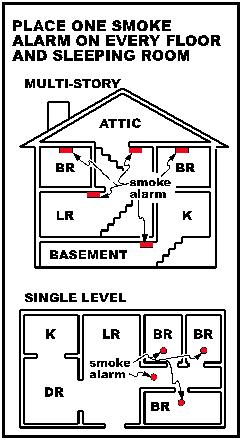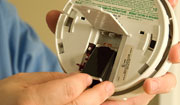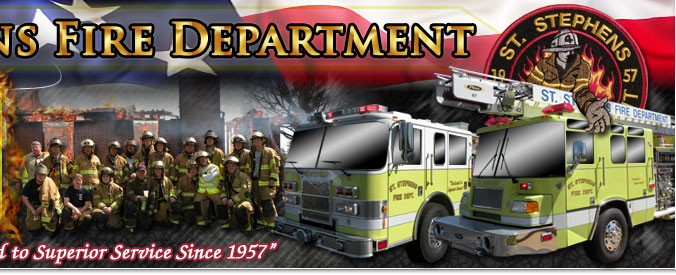|
* HOME FIRE SAFETY *

 
Click on the above links for more Fire Safety Tips!
The St. Stephens Fire Department is committed to preventing fires through education and prevention. We hope you can you can utilize the tips and links on this page to prevent fires and educate your family about fire safety.
More than 3,500 Americans die each year in fires and approximately 20,000 are injured. An overwhelming number of fires occur in the home. There are time-tested ways to prevent and survive a fire. It's not a question of luck. It's a matter of planning ahead.
Fire Safety is Every Ones Job!
Every Home Should Have at Least One Working Smoke Alarm
Buy a smoke alarm at any hardware or discount store. It's inexpensive protection for you and your family. Install a smoke alarm on every level of your home. A working smoke alarm can double your chances of survival. Test it monthly, keep it free of dust and replace the battery at least once a year. Smoke alarms themselves should be replaced after ten years of service, or as recommended by the manufacturer.
Prevent Electrical Fires
Never overload circuits or extension cords. Do not place cords and wires under rugs, over nails or in high traffic areas. Immediately shut off and unplug appliances that sputter, spark or emit an unusual smell. Have them professionally repaired or replaced.
Use Appliances Wisely
When using appliances follow the manufacturer's safety precautions. Overheating, unusual smells, shorts and sparks are all warning signs that appliances need to be shut off, then replaced or repaired. Unplug appliances when not in use. Use safety caps to cover all unused outlets, especially if there are small children in the home.
Alternate Heaters
-
Portable heaters need their space. Keep anything combustible at least three feet away.
-
Keep fire in the fireplace. Use fire screens and have your chimney cleaned annually. The creosote buildup can ignite a chimney fire that could easily spread.
-
Kerosene heaters should be used only where approved by authorities. Never use gasoline or camp-stove fuel. Refuel outside and only after the heater has cooled.
Affordable Home Fire Safety Sprinklers
When home fire sprinklers are used with working smoke alarms, your chances of surviving a fire are greatly increased. Sprinklers are affordable - they can increase property value and lower insurance rates.
Plan Your Escape
Practice an escape plan from every room in the house. Caution everyone to stay low to the floor when escaping from fire and never to open doors that are hot. Select a location where everyone can meet after escaping the house. Get out then call for help.
Caring for Children
Children under five are naturally curious about fire. Many play with matches and lighters. Tragically, children set over 20,000 house fires every year. Take the mystery out of fire play by teaching your children that fire is a tool, not a toy.
Caring for Older People
Every year over 1,200 senior citizens die in fires. Many of these fire deaths could have been prevented. Seniors are especially vulnerable because many live alone and can't respond quickly.

Does Your Smoke Detector Work?
Protect Yourself and Your Family Today!
In the event of a fire, properly installed and maintained smoke alarms will provide an early warning alarm to your household. This alarm could save your own life and those of your loved ones by providing the chance to escape.
Helpful Tip
Pick a holiday or your birthday and replace the batteries each year on that day. It is always a good idea to replace your batteries when the time changes.
If your smoke alarm starts making a "chirping" noise, replace the batteries and reset it.
-
Why Should My Home Have Smoke Alarms?
-
-
In the event of a fire, a smoke alarm can save your life and those of your loved ones. They are a very important means of preventing house and apartment fire fatalities by providing an early warning signal -- so you and your family can escape. Smoke alarms are one of the best safety devices you can buy and install to protect yourself, your family, and your home.
-
-
What Types of Smoke Alarms Are Available?
-
-
There are many different brands of smoke alarms available on the market but they fall under two basic types: ionization and photoelectric.
-
Ionization alarms sound more quickly when a flaming, fast moving fire occurs. Photoelectric alarms are quicker at sensing smoldering, smoky fires. There are also combination smoke alarms that combine ionization and photoelectric into one unit, called dual sensor smoke alarms.
-
Because both ionization and photoelectric smoke alarms are better at detecting distinctly different yet potentially fatal fires, and because homeowners cannot predict what type of fire might start in a home, the USFA recommends the installation of both ionization and photoelectric or dual sensor smoke alarms.
-
In addition to the basic types of alarms, there are alarms made to meet the needs of people with hearing disabilities. These alarms may use strobe lights that flash and/or vibrate to assist in alerting those who are unable to hear standard smoke alarms when they sound.

-
-
Okay, Where Do I Put Them?
-
-
Install smoke alarms on every level of your home, including the basement. Many fatal fires begin late at night or in the early morning. For extra safety, install smoke alarms both inside and outside sleeping areas. Since smoke and many deadly gases rise, installing your smoke alarms at the proper level will provide you with the earliest warning possible. Always follow the manufacturer’s installation instructions.
-
-
Where Would I Get Smoke Alarms?
-
-
Many hardware, home supply, or general merchandise stores carry smoke alarms. If you are unsure where to buy one in your community, call your local fire department (on a nonemergency telephone number) and they will provide you with some suggestions. Some fire departments offer smoke alarms for little or no cost.
-
-
Are Smoke Alarms Hard to Install?
-
-
If your smoke alarms are hard wired, that is wired into the electrical system, you will need to have a qualified electrician do the initial installation or install replacements. For battery powered smoke alarms, all you will need for installation is a screw driver. Some brands are self adhesive and will easily stick to the wall or ceiling where they are placed. For all smoke alarm installations, be sure you follow the manufacturer’s instructions because there are differences between the various brands. If you are uncomfortable standing on a ladder, ask a relative or friend for help. Some fire departments will install a smoke alarm in your home for you. Call your local fire department (on a non-emergency telephone number) if you have problems installing a smoke alarm.
-
-
How Do I Keep My Smoke Alarm Working?
-
-
If you have a smoke alarm with batteries:
-
Smoke Alarms powered by long-lasting batteries are designed to replace the entire unit according to manufacturer’s instructions.

-
In standard type battery powered smoke alarms, the batteries need to be replaced at least once per year and the whole unit should be replaced every 8-10 years.
-
In hard-wired, battery back up smoke alarms, the batteries need to be checked monthly, and replaced at least once per year. The entire unit should be replaced every 8-10 years.
-
What if the Alarm Goes Off While I’m Cooking?
-
-
Then it’s doing its job. Do not disable your smoke alarm if it alarms due to cooking or other non-fire causes. You may not remember to put the batteries back in the alarm after cooking. Instead clear the air by waving a towel near the alarm, leaving the batteries in place. The alarm may need to be moved to a new location. Some of the newer models have a “hush” button that silences nuisance alarms.
-
-
How Long will my Smoke Alarm Last?
-
-
Most alarms installed today have a life span of about 8-10 years. After this time, the entire unit should be replaced. It is a good idea to write the date of purchase with a marker on the inside of your alarm so you will know when to replace it. Some of the newer alarms already have the purchase date written inside. In any event, always follow the manufacturer’s instructions for replacement.
-
-
Anything Else I Should Know?
-
-
Some smoke alarms are considered to be “hard-wired.” This means they are connected to the household electrical system and may or may not have battery backup. It’s important to test every smoke alarm monthly and replace the batteries with new ones at least once a year.
The U.S. Fire Administration would like to remind you of some important fire safety and prevention information.
-
Plan and practice escape plans several times a year.
-
Make sure your whole family knows when and how to call emergency telephone numbers.
-
Obtain and learn how to use a fire extinguisher.
-
Install carbon monoxide detectors.
-
Consider installing residential fire sprinklers in your home.
You may contact the St. Stephens Fire Department at (828) 256-2375 if you need help or have questions about fire safety in your home.
|


